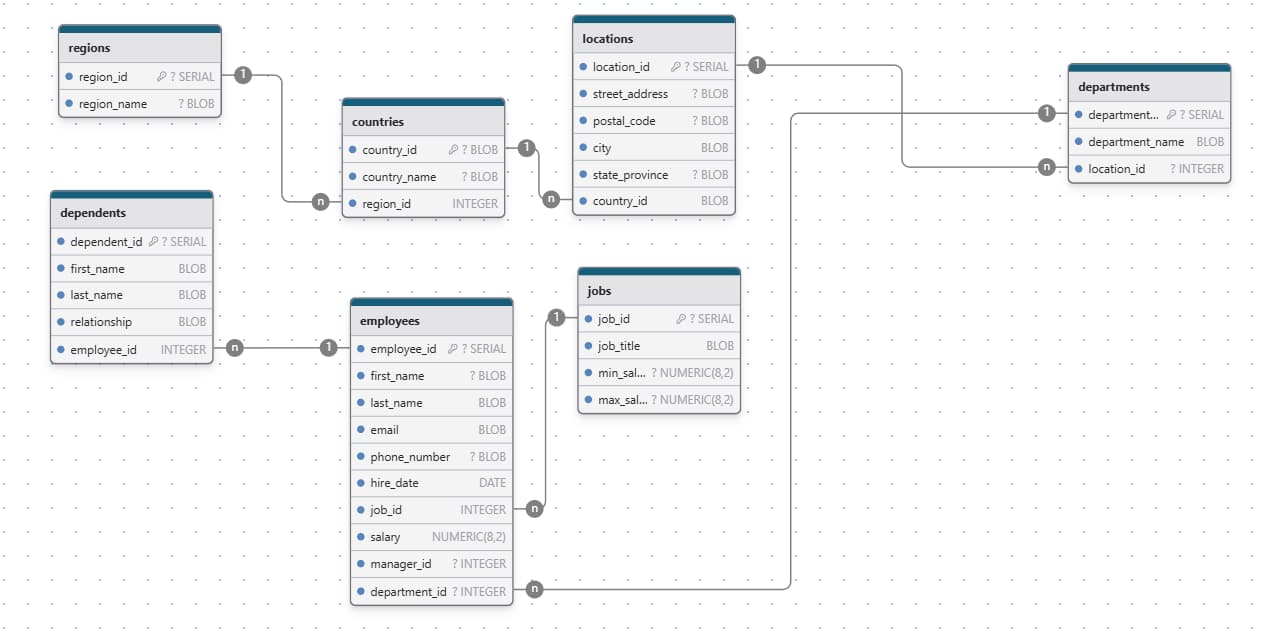Drawdb-app - Render your database model as png, markdown, mermaid, ...

In my RSS feed recently, I came across another great application that lets you create a database model from scratch, i.e. create tables one by one and create the links between them.
However, there's another option that I find really nice: you can get a visual of the tables and relationships of any existing application in a few seconds from an .sql file that you import into drawdb-app.
Let's take a quick look at how it works.
By opening the https://www.drawdb.app/editor website, the first thing you'll be prompted to do is to choose your target database format. For instance, let's choice PostgreSQL (Situation: I'm coding a Laravel application using PostgreSQL and I want to relations of my DB in a nice pic).
I think the most common use I could personally make of it is to load an SQL file. To do this, just click on the File menu, then choose Import from SQL and, finally, retrieve a previously created .sql file from your hard drive.
Create and import a dummy sql file
If you don't have such file, I suggest to copy one from https://www.sqltutorial.org/sql-sample-database/. I put here below a PostgreSQL content found on that site (direct link) or to take any valid .sql file you can found on the Internet.
dummy.sql
CREATE TABLE regions (
region_id SERIAL PRIMARY KEY,
region_name CHARACTER VARYING (25)
);
CREATE TABLE countries (
country_id CHARACTER (2) PRIMARY KEY,
country_name CHARACTER VARYING (40),
region_id INTEGER NOT NULL,
FOREIGN KEY (region_id) REFERENCES regions (region_id) ON UPDATE CASCADE ON DELETE CASCADE
);
CREATE TABLE locations (
location_id SERIAL PRIMARY KEY,
street_address CHARACTER VARYING (40),
postal_code CHARACTER VARYING (12),
city CHARACTER VARYING (30) NOT NULL,
state_province CHARACTER VARYING (25),
country_id CHARACTER (2) NOT NULL,
FOREIGN KEY (country_id) REFERENCES countries (country_id) ON UPDATE CASCADE ON DELETE CASCADE
);
CREATE TABLE departments (
department_id SERIAL PRIMARY KEY,
department_name CHARACTER VARYING (30) NOT NULL,
location_id INTEGER,
FOREIGN KEY (location_id) REFERENCES locations (location_id) ON UPDATE CASCADE ON DELETE CASCADE
);
CREATE TABLE jobs (
job_id SERIAL PRIMARY KEY,
job_title CHARACTER VARYING (35) NOT NULL,
min_salary NUMERIC (8, 2),
max_salary NUMERIC (8, 2)
);
CREATE TABLE employees (
employee_id SERIAL PRIMARY KEY,
first_name CHARACTER VARYING (20),
last_name CHARACTER VARYING (25) NOT NULL,
email CHARACTER VARYING (100) NOT NULL,
phone_number CHARACTER VARYING (20),
hire_date DATE NOT NULL,
job_id INTEGER NOT NULL,
salary NUMERIC (8, 2) NOT NULL,
manager_id INTEGER,
department_id INTEGER,
FOREIGN KEY (job_id) REFERENCES jobs (job_id) ON UPDATE CASCADE ON DELETE CASCADE,
FOREIGN KEY (department_id) REFERENCES departments (department_id) ON UPDATE CASCADE ON DELETE CASCADE,
FOREIGN KEY (manager_id) REFERENCES employees (employee_id) ON UPDATE CASCADE ON DELETE CASCADE
);
CREATE TABLE dependents (
dependent_id SERIAL PRIMARY KEY,
first_name CHARACTER VARYING (50) NOT NULL,
last_name CHARACTER VARYING (50) NOT NULL,
relationship CHARACTER VARYING (25) NOT NULL,
employee_id INTEGER NOT NULL,
FOREIGN KEY (employee_id) REFERENCES employees (employee_id) ON DELETE CASCADE ON UPDATE CASCADE
);
So just copy/paste this SQL in Notepad; save it on your disk and go back to https://www.drawdb.app/editor; File -> Import from SQL.
And let's the magic happens:

File -> Export as feature.You can self host the application thanks to Docker if you want
By visiting https://hub.docker.com/search?q=drawdb-io, you'll find a few Docker images for drawdb-app. For instance https://hub.docker.com/r/xinsodev/drawdb.
To run it, just start docker run --name some-drawdb -p 81:80 -d xinsodev/drawdb and access the interface on http://localhost:81.
Playing with exportation feature
From now, take time to check export features; click on the File menu again and click on Export as.
It's really cool to export a SQL file so easily to JSON but it's even cooler to export as markdown.
Summary
- Introduction
- Database Type
- Table Structure
- regions
- countries
- locations
- departments
- jobs
- employees
- dependents
- Relationships
- Database Diagram
Introduction
Database type
- Database system: PostgreSQL
Table structure
regions
| Name | Type | Settings | References | Note |
|---|---|---|---|---|
| region_id | SERIAL | 🔑 PK, not null | ||
| region_name | BLOB | not null |
countries
| Name | Type | Settings | References | Note |
|---|---|---|---|---|
| country_id | BLOB | 🔑 PK, not null | ||
| country_name | BLOB | not null | ||
| region_id | INTEGER | not null | countries_region_id_fk |
locations
| Name | Type | Settings | References | Note |
|---|---|---|---|---|
| location_id | SERIAL | 🔑 PK, not null | ||
| street_address | BLOB | not null | ||
| postal_code | BLOB | not null | ||
| city | BLOB | not null | ||
| state_province | BLOB | not null | ||
| country_id | BLOB | not null | locations_country_id_fk |
departments
| Name | Type | Settings | References | Note |
|---|---|---|---|---|
| department_id | SERIAL | 🔑 PK, not null | ||
| department_name | BLOB | not null | ||
| location_id | INTEGER | not null | departments_location_id_fk |
jobs
| Name | Type | Settings | References | Note |
|---|---|---|---|---|
| job_id | SERIAL | 🔑 PK, not null | ||
| job_title | BLOB | not null | ||
| min_salary | NUMERIC(8,2) | not null | ||
| max_salary | NUMERIC(8,2) | not null |
employees
| Name | Type | Settings | References | Note |
|---|---|---|---|---|
| employee_id | SERIAL | 🔑 PK, not null | ||
| first_name | BLOB | not null | ||
| last_name | BLOB | not null | ||
| BLOB | not null | |||
| phone_number | BLOB | not null | ||
| hire_date | DATE | not null | ||
| job_id | INTEGER | not null | employees_job_id_fk | |
| salary | NUMERIC(8,2) | not null | ||
| manager_id | INTEGER | not null | ||
| department_id | INTEGER | not null | employees_department_id_fk |
dependents
| Name | Type | Settings | References | Note |
|---|---|---|---|---|
| dependent_id | SERIAL | 🔑 PK, not null | ||
| first_name | BLOB | not null | ||
| last_name | BLOB | not null | ||
| relationship | BLOB | not null | ||
| employee_id | INTEGER | not null | dependents_employee_id_fk |
Relationships
- countries to regions: many_to_one
- locations to countries: many_to_one
- departments to locations: many_to_one
- employees to jobs: many_to_one
- employees to departments: many_to_one
- dependents to employees: many_to_one